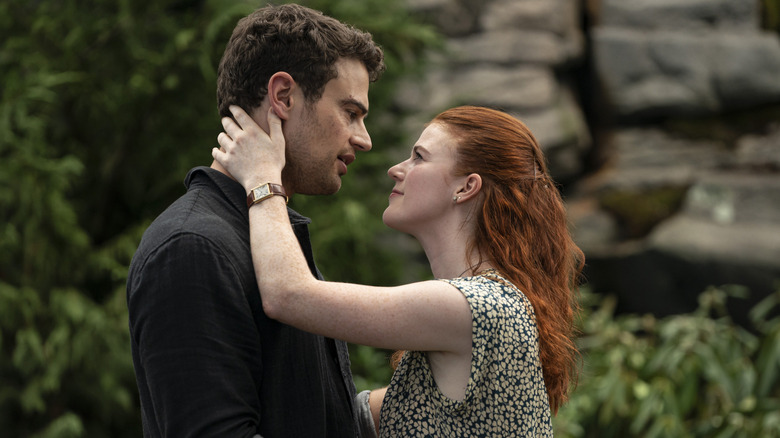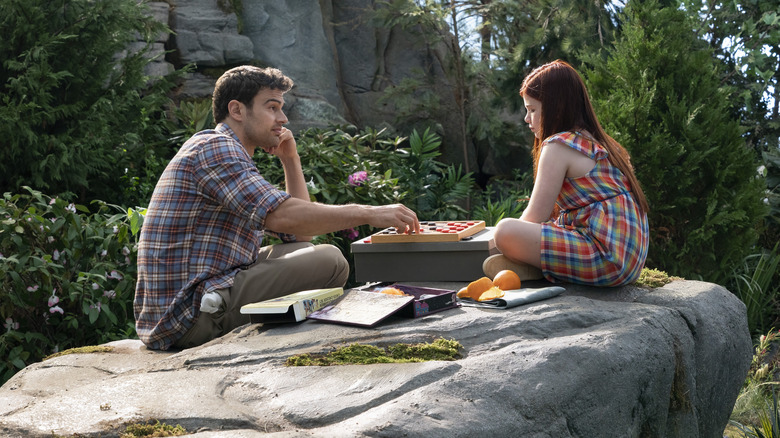The Time Traveler's Wife Review: A Troubling Tale Of Love And Loss That's Too Shallow To Thrive
Steven Moffat's take on "The Time Traveler's Wife" has been a long time coming, as fans of his "Doctor Who"-era know all too well. The story served as inspiration for his award-winning episode "The Girl in the Fireplace," and shades of the main romance would later appear in characters like River Song and Amy Pond; women who embraced a life of adventure by attaching themselves to a charismatic time traveler and becoming his fiery partner-in-crime. While this particular tale of jumping through time is devoid of spaceships and alien invasions, that sense of adventure remains the same — especially if you consider marriage the greatest adventure of them all. Clare Abshire (Rose Leslie) and Henry DeTamble (Theo James) are a classic romance couple — two people who fall in love and share so many of the romantic markers we've all accustomed to. The pining, bickering, and tenderness are deeply familiar and like any real relationship, they must work at holding it together. But they also face an unusual complication (which you can probably infer from the title): Henry has a genetic disorder that causes him to uncontrollably, spontaneously travel through time. His condition brings them together just as it keeps them apart, making their love impossible and inevitable. It becomes the crux of a series packed with fascinating ideas about love and relationships, made all the more intriguing by the sci-fi twist.
There are many layers to the relationship between Clare and Henry. Two people falling in love in the wrong order opens the door to all sorts of complications; miscommunication is a staple of onscreen romance, but the DeTambles give it new meaning. They come at their relationships from two entirely different directions, with different memories of meeting one another whilst decades apart. When we start, Henry is a librarian meeting Clare for what he assumes to be the first time — only to discover that she's known him for most of her life. And there presents the problem: he isn't yet the person she knows he'll become. Instead of the George Clooney-esque suave charmer she expects, she finds a long-haired 28-year-old man, emotionally distant, resistant to settling down, and raging against fate. As she reconciles this reality with the future man she really loves, Henry is facing up to her expectations of who he will become and grappling with the frustration of a future laid out before him. And as if that's not enough, there's also his tendency to disappear and pop into the future or past, leaving only a pile of clothes behind.
"The Time Traveler's Wife" fully embraces elements Moffat's been toying with for the past few decades of his career, and sure enough, the man behind "Sherlock" and "Doctor Who" knows a thing or two about crafting intricate stories with captivating twists and developments. Each of the six episodes comes with its own three-act structure, coming at the relationship from a different aspect and focusing across the timelines. And though this time travel tale is rooted in the every day, David Nutter's visual flair thematically takes things to the next level, finding magic in the mundane. Moffat's varied experience at non-linear storytelling makes him uniquely suited to make sense of this jumble — it's a ridiculously seamless story structure that weaponizes flow, to amplify questions of identity, time, and loss. Unfortunately, peeling back all the stylistic flourishes to dig beyond the charm and snarky banter reveals a disappointing core at the center of this story. Because for all that it boasts on a stylistic level, "The Time Traveler's Wife" can't get out from under the complexities of its flawed romance.
A troubling power imbalance
The best moments of the series use time travel as a jumping-off point to zero in on its characters — interactions between Henry and his older self as he battles self-hatred or stares his future right in the face; the question of what he must do to survive when thrown back in time, lost and naked; Clare's struggle to grasp agency when she knows exactly what her future holds. And that's just the tip of the iceberg. But all that and more gets nudged aside in favor of spending episode after episode failing to convince us to buy into their relationship. Because what I've neglected to mention is that upon meeting for the first time, Clare is 6 and Henry is a full-grown man, in his 40s and already married to a future version of her — and "The Time Traveler's Wife" can't fathom what this means for their dynamic.
With this premise, "The Time Traveler's Wife" keeps true to Audrey Niffenegger's 2003 novel of the same name and the 2009 movie it later inspired, both of which have raised red flags for their relationship dynamic. This adaptation isn't quite sure how to grapple with the nature of this, so it opts to "balance the scales." As the show sees it, Clare is the one who will shape Henry, not the other way around. The fact that she meets him in his 20s and helps shape the man she met in his 40s presents a reality where she's the one in control ("I groomed you," she assures him to assuage our fears). His interactions with young Clare include shallow moments where he grapples with his influence over her, but mostly, he accepts that fate is to blame in this instance. Because he makes no advances before she hits eighteen, he's in the clear, and instead, she becomes the aggressor, impatiently awaiting the day their romance becomes official. Perhaps this would be easier to swallow if Clare's entire being wasn't lost in their relationship.
Rose Leslie brings all the spirit and depth that she can, but the writing is thin. While Henry heads out on his involuntary adventures Clare is left behind, but little time is spent delving into the emotional toll of her role and the impact of his absence. And beyond their relationship? Clare's friends and family are semi-present figures in the show, popping in and out of the weaving timelines, but even their appearances revolve around her relationship with Henry. Time is dedicated to Henry's past, present, and future outside of their romance: his relationship to his powers and his parents, the weight of loss and previous romantic encounters. But Clare doesn't get the same treatment.
Henry's story is more immediately enticing, given his time-traveling abilities, but isn't the show named after Clare? Even the title becomes yet another way that she's defined by him. Clare is completely shaped around Henry, which is annoying all on its own, but deeply distressing given the origin of her relationship to him. It certainly doesn't help that she takes every opportunity to shout this to high heavens, declaring things like "I formed myself around you," "I grew up waiting for you," and even "I shaped my libido around you." There is no shortage of these, stating the power imbalance in bold letters but never peeling back the layers of what that means, lest we have to deal with some discomfort. The fact that she's loved him since the age of six should be a conflict — a point worth exploring (if not immediately condemning), but it is merely dismissed. Somewhere in here is a layered examination of the way people orient themselves around another that prods at how power fits into romantic relationships, but that story was too hard to tell, so the series skirts by on style over substance, never giving its characters or concepts the depth they deserve.
/Film Rating: 5 out of 10
"The Time Traveler's Wife" premieres on May 15, 2022 on HBO and HBO Max.

